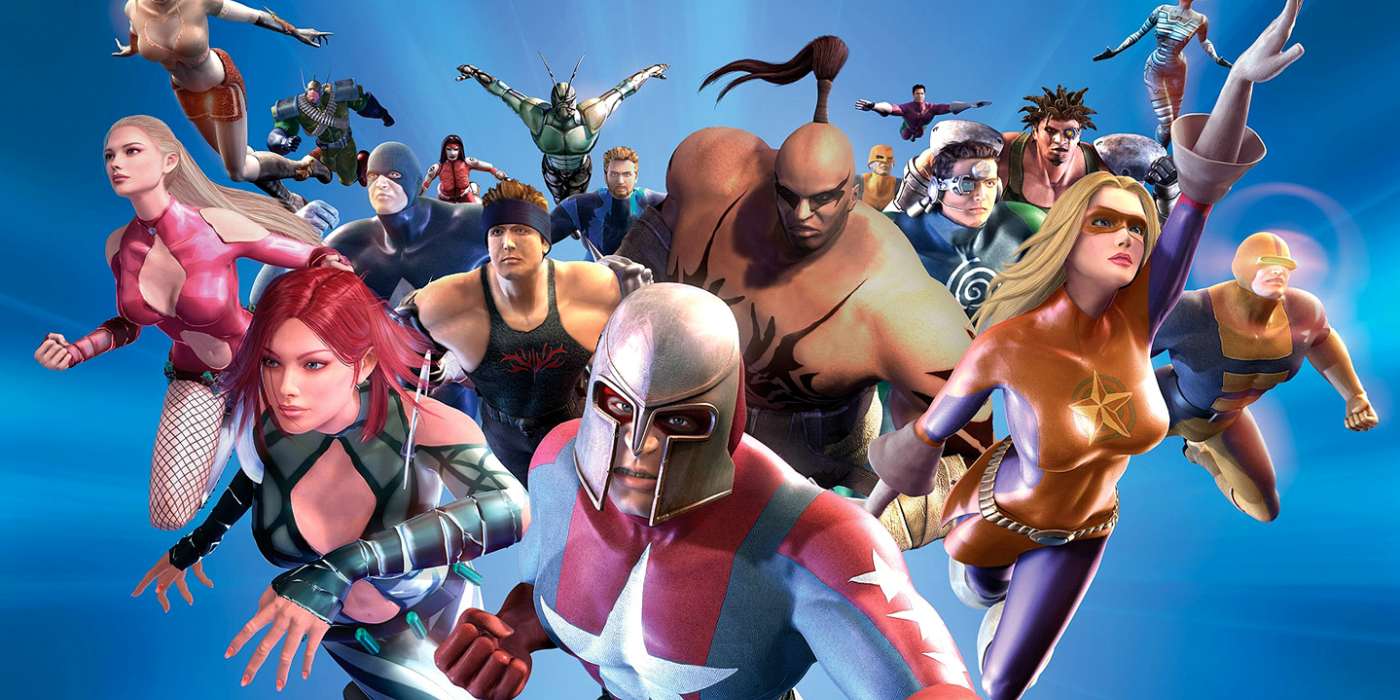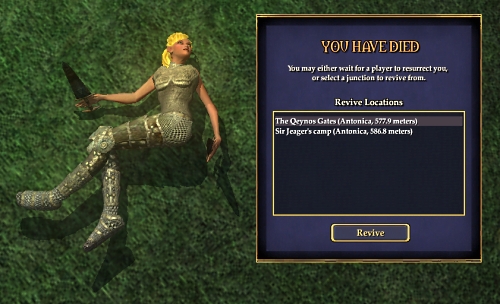Early MMOs came up with the most painful game mechanic of all time, and it's somehow still in use today
I'm still traumatized by games that put me in XP debt for dying.

Keep up to date with the most important stories and the best deals, as picked by the PC Gamer team.
You are now subscribed
Your newsletter sign-up was successful
Want to add more newsletters?

Every Friday
GamesRadar+
Your weekly update on everything you could ever want to know about the games you already love, games we know you're going to love in the near future, and tales from the communities that surround them.

Every Thursday
GTA 6 O'clock
Our special GTA 6 newsletter, with breaking news, insider info, and rumor analysis from the award-winning GTA 6 O'clock experts.

Every Friday
Knowledge
From the creators of Edge: A weekly videogame industry newsletter with analysis from expert writers, guidance from professionals, and insight into what's on the horizon.

Every Thursday
The Setup
Hardware nerds unite, sign up to our free tech newsletter for a weekly digest of the hottest new tech, the latest gadgets on the test bench, and much more.

Every Wednesday
Switch 2 Spotlight
Sign up to our new Switch 2 newsletter, where we bring you the latest talking points on Nintendo's new console each week, bring you up to date on the news, and recommend what games to play.

Every Saturday
The Watchlist
Subscribe for a weekly digest of the movie and TV news that matters, direct to your inbox. From first-look trailers, interviews, reviews and explainers, we've got you covered.

Once a month
SFX
Get sneak previews, exclusive competitions and details of special events each month!
As long as there have been videogames, there have been penalties for dying in videogames. In the earliest days dying meant losing out on a high score or having to put another coin in the arcade machine. As technology progressed, so did our protections against the harshest deaths—we got saves, checkpoints, bonfires. But a few game developers decided all that progress was nonsense. Games didn't just need to be harder, actually—they needed to be mean as hell.
And thus the cruelest game mechanic of all time was born: XP debt.
I first came across this abomination of game design playing 2004’s otherwise outstanding MMO City of Heroes. The twisted idea behind XP debt is this: if you die, a percentage of your XP bar is turned into debt. As long as you're in debt, your XP gain is reduced, usually by half, until the debt is repaid. From there, you can resume your merry way leaping from building to building doing hero stuff, battling baddies, saving citizens, having your dial-up connection severed because someone needed to make a phone call…
XP debt and dial-up were a truly agonizing combination.
Now, as an ancient MMO guy myself, I can hear all you other ancient MMO guys lurching from your Aeron chairs ready to ‘Well, akshually’ me about how other death penalties were just as brutal. I’ve been there: I’ve bound my EverQuest toon at the Temple of Veeshan, fallen asleep during a Vulak standoff, and woken up to my character losing a month’s worth of progress as he respawns, dies, respawns, dies, respawns, cries. I’ve carefully taken my nascent Jedi in Star Wars Galaxies to the ends of the galaxy to try to level him up, only to lose one of my precious three lives to a lag spike. I’ve failed to notice the iron maiden on some skelly knights doing my eight thousandth Diablo run on hardcore and had my barb instantly splattered across the wall.

We had it all kinds of rough with online games back then.
But man, there is nothing quite as disheartening as seeing your whole XP bar lit up in red. A grim, inescapable, ever-present reminder of your failure as a gamer and a human. A trophy, of sorts, to the kind of catastrophe that hurts in the way that only something you brought upon yourself can hurt. A promise, written in blood, that the next chunk of your life grinding experience for your character will literally take twice as long and there’s not a thing you can do about it.
Keep up to date with the most important stories and the best deals, as picked by the PC Gamer team.
Because what are your options? Do you go on tilt, chasing the highest reward missions and experience, trying to burn it off as fast as possible? Those are the most dangerous, so you can soon find yourself dining at the table of compound interest as your frustration leads to poor play leads to more deaths leads to more debt.
Or do you play it safe and settle in for the long grind? Your paltry experience gains will get you out of the red, to be sure, but when you’re paying half of your points to the alimony of gamer fail, it’s not a fun place to be.
Perhaps XP debt was intended to be a gentler penalty than losing experience and de-leveling. After all, at least with XP debt there’s a cap—at a certain point you’re as indebted as you’re ever going to be. You can’t lose your level, it doesn’t take away your gear. But tell that to the poor bastard knifing komodo dragons in the head on a remote planet playing Icarus for the 10,000th time because a bear charged him while he was trying to make a campfire (it's me; I'm the poor bastard).
Somehow two decades on devs are still using this mechanic! It was in 2004's EverQuest 2, which came out not long after City of Heroes. EverQuest creator Brad McQuaid liked it so much that he then used it in his next MMO, the ill-fated Vanguard: Saga of Heroes in 2007. I know those are both ancient history, but more recently it resurfaced in the survival genre in 7 Days to Die and Icarus. Somehow in their quest to design systems that punish players for failure, they settled on something even the old testament provided relief from.
Death should matter in games. Not all games have to be hardcore, high skill ceiling, deathgrip-on-the-mouse extraction games, but much of the enjoyment from gaming comes from there being stakes. Ultimately games are a kind of story, and a story with no stakes isn’t much of a story. If there’s no chance the hero fails, then we don’t really care that much whether or not they succeed. Even cozy games like Stardew have systems in place to encourage good play, gently frustrating the player or nudging them in the right direction.
I’ve sunk countless hours into early roguelikes like Stone Soup and Nethack, love a Hades playthrough, and occasionally roll a hardcore Path of Exile character because there is value in striving. Great games encourage you in that journey—no matter how painful it is losing a bunch of runes in Elden Ring, you know that you gathered them once. Despite your setback, you can do it again.
XP debt actively discourages you from this striving. Whatever you were trying to do at the moment of your untimely demise, whether it was mining for rocks, battling a supervillain, or just walking from point A to point B, is now half as rewarding. It ups the stakes, but also saps the joy out of any success that comes off the back of failure. It’s one thing to take something away from me, and quite another to tell me that my effort in the future is less valuable. It’s just so much more discouraging.
I still get a thrill out of games that make death scary, but XP debt isn't The Exorcist scary, it's "you're being audited" scary. I hope XP debt's appearance in Icarus doesn't lead to a resurgence of some kind. Let it stay dead and buried—or at least sequestered to the City of Heroes private server where it can't hurt anyone who isn't asking for it.
Russ has been playing PC games since the top of the line graphics were in ASCII and has been obsessed with them just about as long. After a coordinated influence campaign to bamboozle his parents into getting a high speed internet connection to play EverQuest, his fate was well and truly sealed. When he's not writing about videogames, he's teaching karate, cooking an overly complicated dish, or attempting to raise his daughter with a well rounded classical education (Civilization, Doom, and Baldur's Gate, of course). He's probably mapping in Path of Exile right now.

